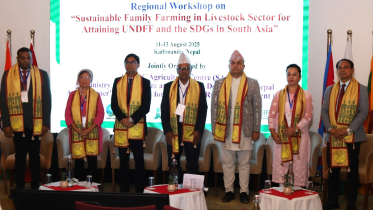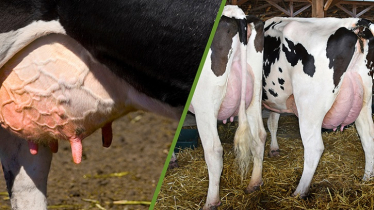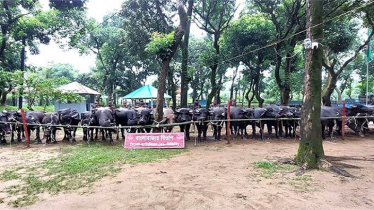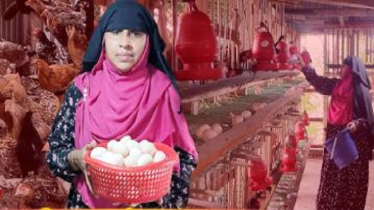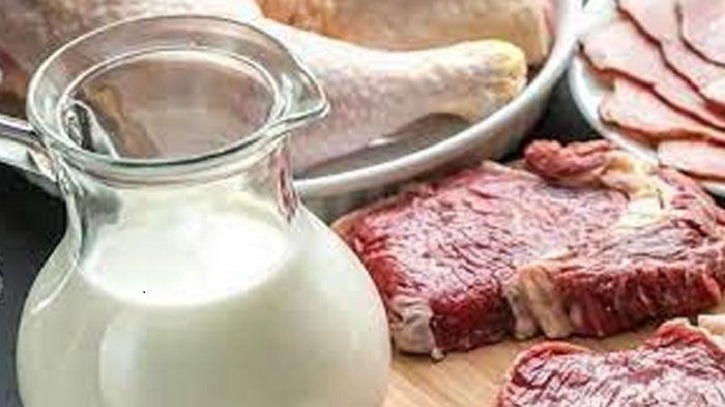
In an effort to meet national nutrition needs, reduce rural poverty, and improve the living standards of farming communities, the government has taken an initiative to enhance local cattle breeds for increased milk and meat production.
As part of this effort, the government will implement a five-year project titled “Production of Proven Bulls for Increased Milk and Meat Production,” beginning in the 2025–26 fiscal year. The project, with a budget of Tk 69 crore, will be jointly executed by the Department of Livestock Services (DLS) and the Bangladesh Livestock Research Institute (BLRI) across 93 upazilas in 18 districts under four divisions.
Under the project, 400 bull calves from crossbreeds such as Deshi-Friesian, Deshi-Sahiwal, Red Chittagong, Pabna, Munshiganj, and Grey cattle of North Bengal will be selected based on the average milk yield of their mother cows. All selected calves will undergo performance testing, and 200 will be shortlisted as “selected bulls.” Semen will be collected from each of them, and after breeding value evaluation, the top performers will be officially designated as “proven bulls.”
Dr. M. Mostafizur Rahman, project director at DLS, stated that the use of proven bulls will aid in developing high-yielding cattle breeds capable of significantly improving national milk and meat production.
The primary objectives of the project include increasing and sustaining livestock productivity, preserving and improving the genetic traits of local breeds, and enhancing the capacity of farmers and field officials through training.
Officials from the Ministry of Fisheries and Livestock noted that the initiative aligns with the broader national goal of ensuring food security through increased livestock productivity. They also referenced the National Livestock Development Policy 2007, which stresses the importance of strict genetic evaluation and selection of breeding animals for nationwide distribution.
Project documents indicate that many hybrid cows in rural areas are already producing 25 to 30 liters of milk per day. However, sustaining this level of productivity requires high-quality semen. Unplanned and uncontrolled breeding practices, along with indiscriminate semen use, have been diminishing the productivity of high-yielding cows, underscoring the urgent need for genetically superior bulls.
As part of the project, 34,375 farmers will receive training, and incentives will be provided to 7,500 owners of high-producing cows under the “Elite Cow” program. Farmers will be encouraged to use semen from elite bulls, while also receiving vaccines, medicine, and livestock feed as part of the support package.
The World Health Organization recommends a daily milk intake of 250 milliliters per person. However, per capita daily consumption in Bangladesh remains far below that level. According to the 2022 Household Income and Expenditure Survey (HIES), the average daily per capita intake of milk and dairy products in the country is only 34.1 grams, highlighting the urgent need to improve livestock productivity.
Due to government initiatives, approximately 150,000 cattle and goat farms have been established in recent years. The total number of registered and unregistered dairy farms stands at around 1.2 million, involving nearly 10 million people directly and indirectly, marking a silent revolution in livestock production across the country.
According to the Ministry of Fisheries and Livestock, the country currently has 66,000 registered farms and 70,000 unregistered ones, totaling 136,000. The Department of Livestock Services has 577,416 registered farmers on its list.
Officials believe that with successful implementation of various livestock development projects, including the proven bull initiative, the current deficit in national milk production can be addressed and overcome.


